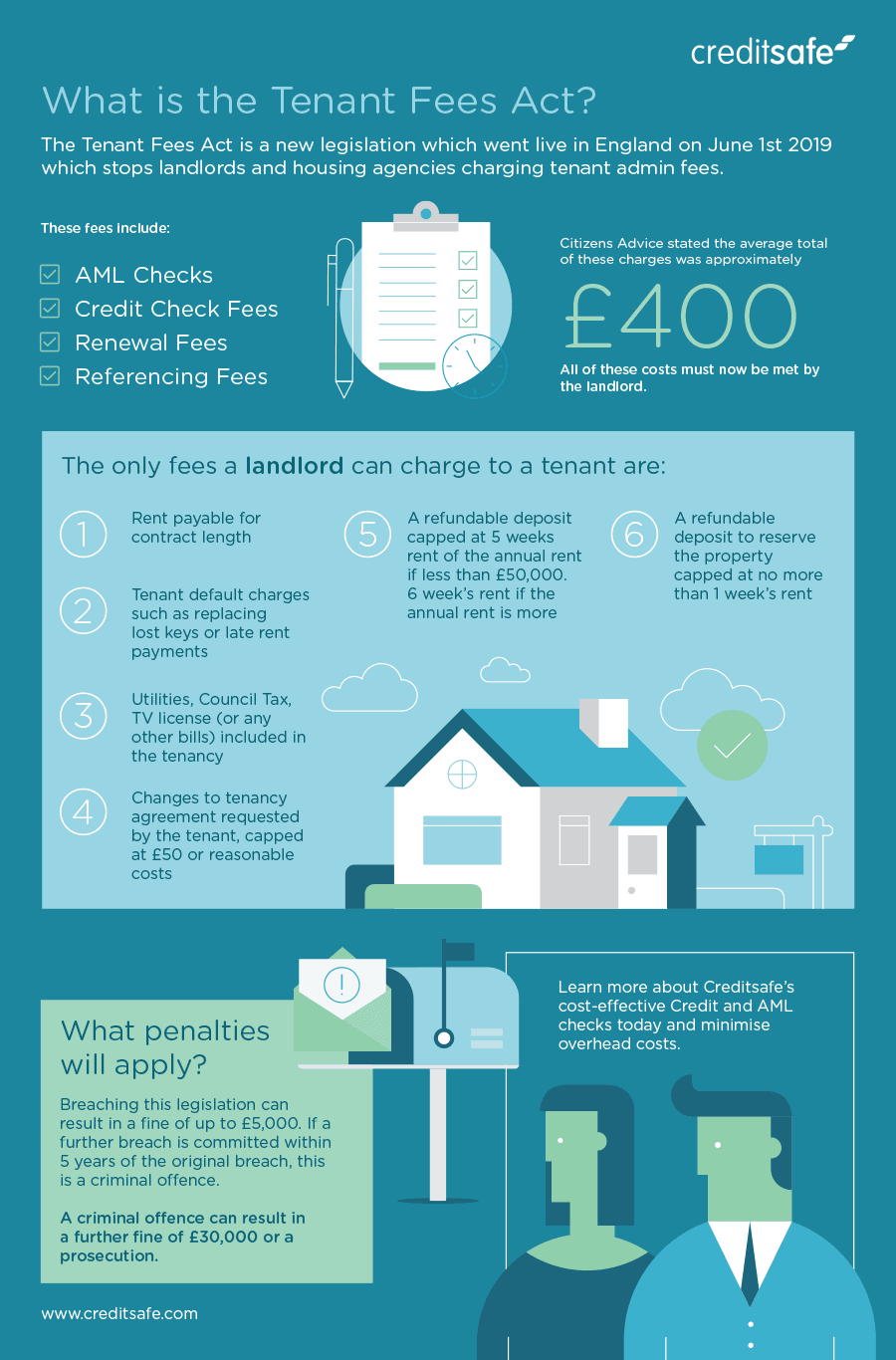The Tenant Fees Act is a new legislation which went live in England on 1st June 2019, which stops landlords and housing agencies charging tenant admin fees.
Learn more about what the Tenant Fees Act is using our helpful infographic below.

This act was created to prevent tenants from getting charged what may be described as ‘hidden fees’. It also provides new caps on other charges made to the tenants. This includes:
- Credit Check Fees – used to determine the general credit rating of tenants, so landlords know their creditworthiness and likelihood of paying rent on time.
- AML Checks – used to determine whether the tenant has ever been involved with money laundering activities.
- Renewal Fees – a fee that is sometimes charged for simply renewing an annual contract despite remaining relatively unchanged from the previous year.
- Referencing Fees – Landlords and agencies have previously charged tenants to chase references from past landlords and employers.
- Citizens Advice has stated that the average total of these charges is approximately £300 - £400 per tenant. To protect the tenant, these costs must now be met by the Landlord.
- Although this act is used to prevent landlords and agencies taking advantage of tenants (often by charging the tenants more than the actual cost of these checks), there is the fear that these overheads can negatively affect housing agencies.
Perform a free tenant check with Creditsafe
What can a landlord charge a tenant?
The Tenant Fees Act only allows landlords and letting agencies to legally charge tenants:
- Rent - rent payable for contract length.
- Utilities, Council tax, a TV license or any other reasonable bills included in the tenancy.
- A refundable deposit – capped at 5 weeks' rent if the annual rent if less than £50,000. 6 weeks' rent if the annual rent is more than £50,000.
- A refundable deposit to reserve the property – capped at no more than 1 week’s rent.
- Changes to tenancy agreement requested by the tenant – capped at £50 or ‘reasonable costs’. This can also include the early termination of the contract itself, which allows the landlord to charge the loss suffered as a result of said termination.
- Tenant default charges – this includes having to replace a key or security device for the property (must be able to prove the cost of these replacements). Or the failure to pay rent on time before the end period of 14 days following the due date agreed within the tenancy agreement.
What penalties will apply?
- Breaching this legislation can result in a fine of up to £5,000. If a further breach of the Tenant Fees Act is committed within 5 years of the original breach, this is a criminal offence.
- A criminal offence can result in a further fine of £30,000 or a prosecution.
- A penalty notice will first be enforced on the landlord or letting agency as a ‘notice of intent’. This notice of intent must be served within 6 months of the evidence of the breach to the enforcement agency.
- Any financial penalty is owed as well as the prohibited payments or deposits requested from the tenant.
- This can also be served while the breach is ongoing and up until 6 months after the last day the breach was made.
What can you do? (Landlords and letting agencies)
Following this act, landlords and agencies must be prepared to take on these costs if they had previously been charging tenants for these checks. If you need to conduct an AML or credit check on a prospective tenant before the tenancy agreement or at any time during the contract, finding a cost-efficient solution is key.
Creditsafe provides these cost-effective solutions so that you don’t need to raise the cost of rent substantially or take on a huge fee. Whether you are looking for a limited number of checks or enough for you to take on new tenants every day, we can help.
If you are taking holding deposits often, you must now be prepared to repay them within the allotted time. 7 days is often the agreed terms, so if you are using cheques (which can take longer), it may be time to rethink your repayment methods.
To get the full information about the Tenant Fees Act you can visit the Government website.